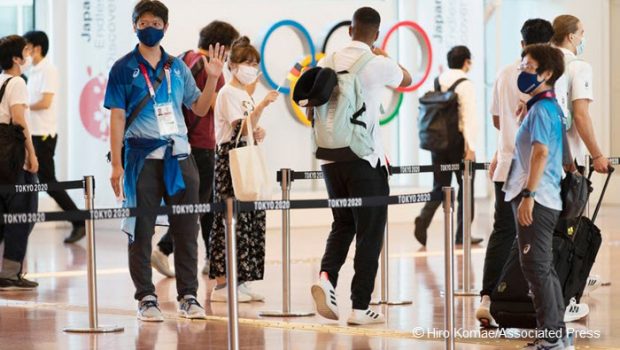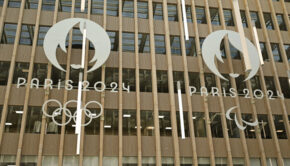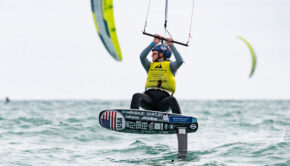Rising COVID-19 problems at Tokyo 2020
Published on July 18th, 2021
In this report by the Wall Street Journal, the challenge of staging the world’s biggest sporting event during a pandemic is detailed as a stream of athletes and others test positive for the virus after entering Japan:
(July 18, 2021) – The long-feared possibility that the COVID-19 pandemic could disrupt the Tokyo Olympics is rapidly emerging as a reality, as Games organizers scramble to deal with a rising load of athletes and officials who are testing positive upon arrival in Japan.
The stream of positive cases is quickly demonstrating how difficult it will be to stage one of the world’s largest events during a global pandemic. Tens of thousands of participants from more than 200 countries are entering a country where the vaccination rate of the local population remains low and the more-contagious Delta variant is spreading.
Officials have a dilemma that will run throughout the Games. The Japanese public is deeply wary of the Olympics, fearing an outbreak that will spill into the general population. So they are deploying strict rules to limit the risk—which could block athletes from participating if they become ensnared in COVID protocols.
South Africa’s soccer governing body today said two of its men’s team members based in the Olympic Village and a technical staff member had tested positive and were being isolated. Also testing positive after arrival was International Olympic Committee member Ryu Seung-min from South Korea, Games organizers said.
Also today, the British Olympic Association confirmed that six athletes and two staff members from its track and field team were identified as close contacts of an individual—not from the Team GB delegation—who tested positive following their arrival in Tokyo on July 16. The British delegation members have continued to test negative and are in self-isolation in their rooms at the team’s camp.
In all, 55 people connected to the Olympics, including officials and contractors working on the Summer Games, have tested positive since July 1, according to data from the organizers.
Some have been ensnared by protocols even before stepping on Japanese soil. USA Basketball was days away from leaving for the Olympics when Bradley Beal was suddenly ruled unable to participate, which suggests the National Basketball Association star tested positive in training camp.
The U.S. team was already traveling to Tokyo without three players, who are planning to hop on a plane after the NBA Finals. But the league is now dealing with its own COVID worries, as players, coaches, referees, and television analysts have been sidelined in the past week.
Tokyo Olympics organizers have been shifting their protocols almost daily to try to head off problems. But with some competitions beginning July 21, ahead of the official opening on July 23, the possibility looms that some athletes will miss their events because of COVID-related issues.
The U.S. women’s gymnastics team, featuring Olympic superstar Simone Biles, provided an early preview of this uncertainty when one member of the group tested positive for the virus in Japan before subsequently testing negative, leading to the conclusion that the first result was a false positive.
The organizers say extensive testing for Olympic participants, including before travel to Japan, on arrival and throughout the Games, as well as social-distancing, mask-wearing and quarantine regulations, will prevent a widespread outbreak of the virus. They also have an evolving protocol in place to try to prevent athletes from being needlessly held out of events.
Spectators are banned from most events. Athletes are tested each day. Rather than sightseeing or socializing after their events, they are required to leave the Olympic Village 48 hours after their event ends or they’re eliminated, whichever comes first. The organizers say over 80% of athletes are fully vaccinated.
“The participants of the Olympic Games are the most controlled population in the world,” IOC Olympic Games Operations Director Pierre Ducrey said.
But the Olympics aren’t a sequestered “bubble” like the one that American professional sports leagues built last year. NBA players traveled to Walt Disney World by private jet, unlike the majority of Olympians, who used commercial flights—which have already produced problems involving the Kenya’s women’s and South Africa’s men’s rugby 7s teams, after at least one passenger on each of their respective flights tested positive for COVID-19 upon landing.
The NBA’s bubble also depended on testing extensively before arrival and confining teams to individual rooms for two days of quarantine until testing out. It worked: The league reported zero cases among players.
Those precautions were necessary before the development of highly effective vaccines, but the Olympic organizers haven’t required athletes to be vaccinated. Olympic officials didn’t want to be seen as prioritizing young, healthy people over the millions of older and medically vulnerable people around the world who lack access to vaccines.
The incubation period of up to 14 days for the virus means athletes could test negative repeatedly before suddenly producing a positive test result just before or during competition. The chief medical officer for the South African team said the incubation period was likely the reason why the two athletes in the village tested positive. The South African men’s soccer team is due to play its first game on July 22.
“Every member of Team South Africa required full medical clearance as an eligibility criteria. In addition, they were encouraged to isolate for two weeks pre-departure, monitor health daily, report any symptoms, and produce two negative nasopharyngeal PCR tests taken within 96 hours of departure, as per Tokyo 2020 requirements,” Dr. Phatho Zondi said.
The overriding problem for Tokyo organizers is that there is no escaping the density or indoor nature of international travel to the Olympic Games and on to their accommodation. And then, there is no escaping in many sports the ongoing nature of contact between athletes—almost always maskless for their high-intensity activities. That means that a single positive test invariably draws in more athletes, and potentially whole teams.
Tokyo organizers have now ruled that athletes identified as close contacts will have a nose swab PCR test every day and must be quarantined in a single room all the time, including for meals. Athletes will be allowed to attend training sessions and compete as long as they test negative within six hours before the start of each training session or competition, as well as immediately prior to competition, according to Tokyo organizers.
Vaccines have shown to be very effective at preventing COVID-19 death and serious illness, but they don’t prevent infection entirely. A number of vaccinated athletes have tested positive. Scientists don’t yet know for sure whether vaccinated people who test positive are contagious.
Jonathan Finnoff, the chief medical officer for the U.S. Olympic & Paralympic Committee, said in a recent interview that organizers would likely consider a variety of factors as part of their contact tracing and determinations on who should be held out of competition. Among them are the length and nature of contact people had with a person who subsequently tested positive, and even potentially the viral load of that person.
Tokyo 2020 details – Race information – Entry list – How to watch
Race schedule is staggered for the ten events from July 25 to August 4.
Tokyo 2020 Olympic Sailing Program
Men’s One Person Dinghy – ILCA 7
Women’s One Person Dinghy – ILCA 6
Men’s Two Person Dinghy – 470
Women’s Two Person Dinghy – 470
Men’s Skiff – 49er
Women’s Skiff – 49erFx
Men’s One Person Dinghy Heavy – Finn
Men’s Windsurfing – RS:X
Women’s Windsurfing – RS:X
Mixed Multihull – Nacra 17
Original dates: July 24 to August 9, 2020
Revised dates: July 23 to August 8, 2021
Source: World Sailing









 We’ll keep your information safe.
We’ll keep your information safe.